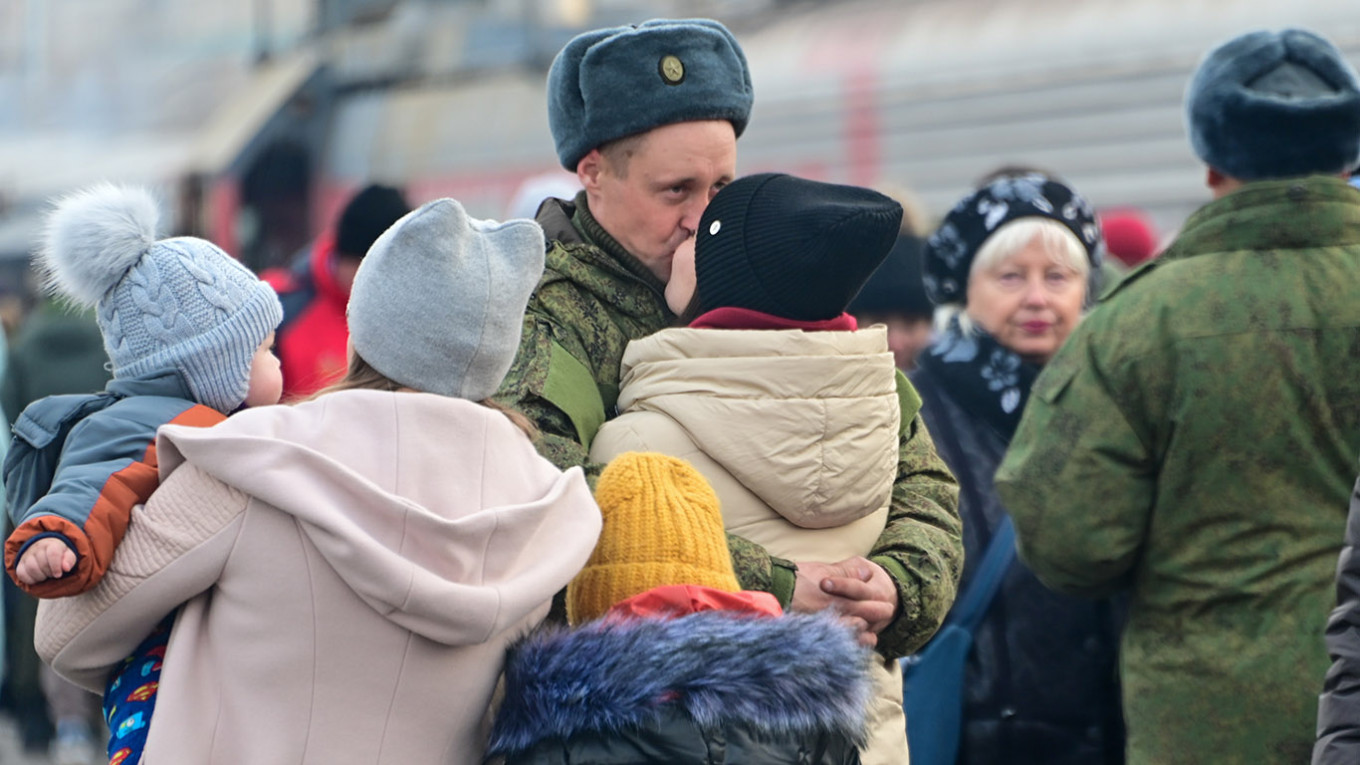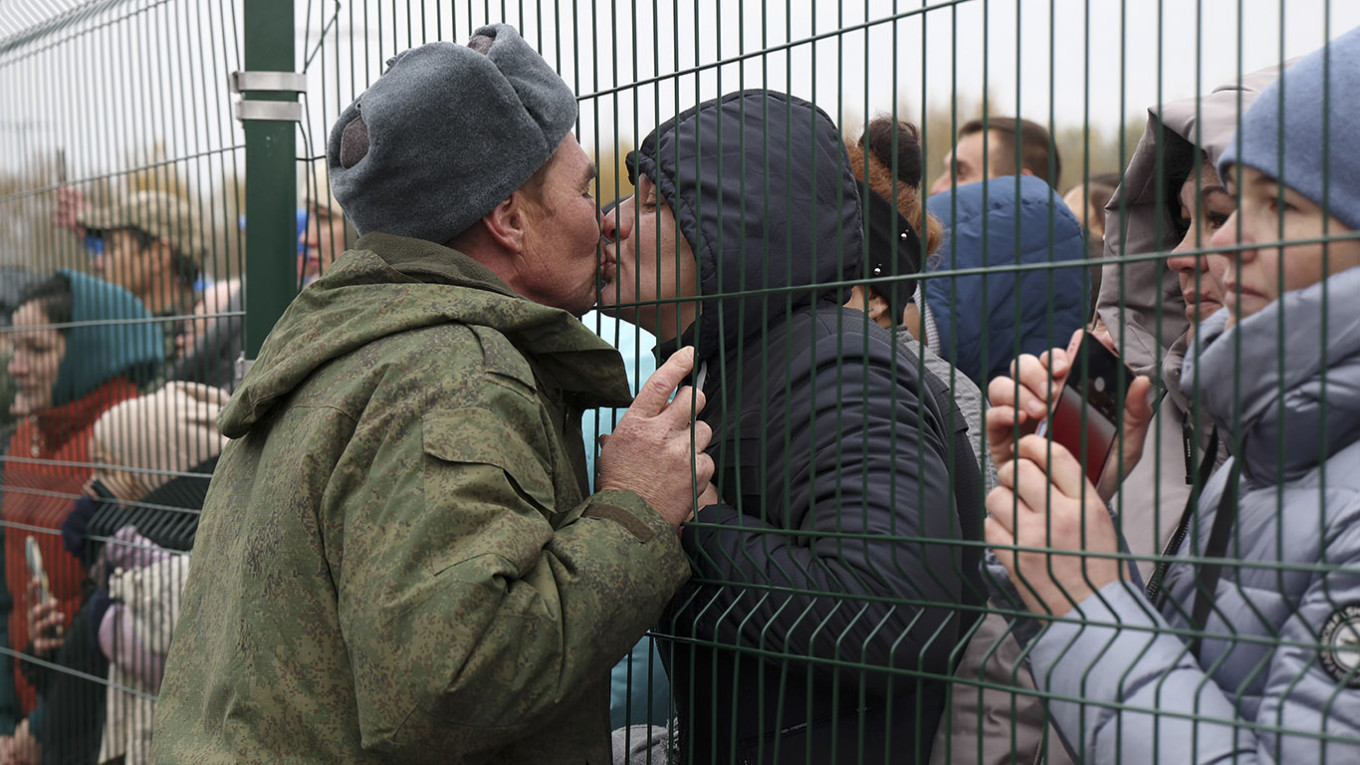“The dark side of love. We’ll discuss, condemn and make infamous those who seduce for money,” reads the since-changed description of the Blacklist SVO group on the social network VKontakte.
The group, which appeared this month, publishes information about women who have allegedly married Russian soldiers for financial gain or tricked them out of money.
More than three years into the full-scale invasion of Ukraine, Russian soldiers, who enjoy high salaries and social benefits, have become popular suitors for some low-income women. While married to a soldier, a woman can secretly take out loans in his name, embezzle his car, and, if he is killed in the war, receive a government payout of 5 million rubles (about $63,111).
But women suspected of marrying a soldier for money rather than love can increasingly expect to become a target of widespread vitriol online.
The idea behind Blacklist SVO came from a discussion on the popular VKontakte page Overheard at the SVO, where a follower named Olesya warned soldiers about the mercenary nature of some Russian women.
“Create a blacklist of gold diggers who’ve already been caught in the act. With photos, their details, etc. I think it’d be really useful. I already have one candidate for the list,” replied another follower, Valentina.
Under her comment, which received dozens of likes, other women chimed in to support the idea “so the guys can see and not fall for it.”
The group currently has around 100 followers, and its numbers are growing. It’s just one example of how cyberbullying against women is escalating in pro-war online spaces.
In April, pro-war blogger Anastasia Kashevarova publicly called for the punishment of the 21-year-old widow of Russian soldier Georgy Kostyrko, who she claimed had worked for an escort agency and married the soldier out of greed.
“The state should not be paying blood-soaked money to whores. It discredits both the army and the image of Russian women,” Kashevarova wrote on her Telegram channel, which has nearly 250,000 subscribers.

During wartime, traditional gender roles tend to become more rigid and deeply binary, Natalia Baranova, a journalist and fellow at the Center for Women, Peace and Security at the London School of Economics, told The Moscow Times.
“A man must be a protector, and a woman must support him in everything. This norm is built on gender-based violence and discrimination. These ideas make it possible to justify war, to participate in it, and to sustain a militaristic discourse where only the interests of the state matter — not those of the individual,” she said.
The roots of this cyberbullying may lie in dominant gender norms in Russia, gender researcher Dasha Manzhura told The Moscow Times.
“Stepping outside the socially accepted gender norm appears as an attack on the group identity of women who respond aggressively,” she said. “Their actions are driven both by a desire to defend themselves and by fear that their worldview is being shaken.”
“The only goal of this kind of online harassment is to intimidate women and publicly ‘put them in their place’ during wartime. This isn’t about women’s solidarity,” said Baranova. “Solidarity in this case would mean recognizing shared pain — poverty and inequality in the country, and the instability and insecurity women face.”
Some of the targeted women are even forced to issue public apologies.
In April, police in the Tomsk region released a video of a real estate agent apologizing after she jokingly advised women to use compensation payments intended for relatives of fallen soldiers to buy apartments.
“It really turned out horribly. I ask for your forgiveness,” Marina Orlova says in her apology.
Later, a local court sentenced Orlova and the blogger who interviewed her to 80 hours of mandatory community service. The court found the women guilty of inciting hatred and humiliating human dignity.
Regional journalists have even produced dedicated reports about so-called “predatory” women.
On a local TV channel in the city of Nizhny Novgorod, reporters filmed a segment on a soldier named Mikhail who transferred 900,000 rubles ($11,300) to his ex-wife Yekaterina.
The couple had married shortly after Mikhail returned on leave from the war in Ukraine. Speaking to reporters, he said he fell victim to what he believes was a scam.
“She stopped replying to my messages after the last [money] transfer. She blocked me on social media,” he says, wearing a camouflage face covering. Mikhail claimed he continued sending her money because he genuinely hoped to start a family.

“It hurts that we’re defending the Motherland, people, the elderly, women — and back home, there are people like this who just take the money [from a soldier] and disappear,” says Mikhail. He plans to file charges against his ex-wife in court and with the police.
In online dating groups, many soldiers now explicitly state that they are only looking for “pure” love.
“Tired of greedy and materialistic women. I just want a simple family life,” says Ilya, a soldier currently fighting in Ukraine. He attaches a photo of himself in uniform, explaining that he’s self-conscious about a scar from a wound.
“So nice to read… Every word says: Man,” One subscriber named Anzhelika writes in the comments below his post. Others write that “scars make a man handsome” in hopes of making a connection.
In other cases, women themselves stress they are not after soldiers’ money.
“I’m self-sufficient, not materialistic, independent, sociable, cheerful, with a sense of humor,” writes a 27-year-old single woman from St. Petersburg.
Moderators of military dating groups often warn men not to send money to women, with posts noting that “too many beggars have popped up.” Heated debates frequently arise over who should pay for travel and other expenses for the first date.
In these discussions, people often portray soldiers as “kind and trusting guys” who are easy to deceive.
“It’s a good thing [Russia] is now planning to toughen the law because of you, greedy women. Go serve too, instead of chasing money,” complains one follower in the Overheard at the SVO group.
In May, lawmakers in the lower-house State Duma proposed a bill that would prohibit dividing military compensation in divorce cases if the marriage occurred after Feb. 24, 2022.
Under the proposal, these payments would be considered the soldier’s personal property. Officials say the measure is intended to prevent women from “abusing the institution of marriage and family law.”
“Those who break the traditional image of a woman by marrying for selfish reasons become a threat to the gender order,” gender researcher Manzhura said. “That’s why they will be attacked not only by women, but by anyone whose worldview they destabilize.”
A Message from The Moscow Times:
Dear readers,
We are facing unprecedented challenges. Russia's Prosecutor General's Office has designated The Moscow Times as an "undesirable" organization, criminalizing our work and putting our staff at risk of prosecution. This follows our earlier unjust labeling as a "foreign agent."
These actions are direct attempts to silence independent journalism in Russia. The authorities claim our work "discredits the decisions of the Russian leadership." We see things differently: we strive to provide accurate, unbiased reporting on Russia.
We, the journalists of The Moscow Times, refuse to be silenced. But to continue our work, we need your help.
Your support, no matter how small, makes a world of difference. If you can, please support us monthly starting from just $2. It's quick to set up, and every contribution makes a significant impact.
By supporting The Moscow Times, you're defending open, independent journalism in the face of repression. Thank you for standing with us.
Remind me later.






